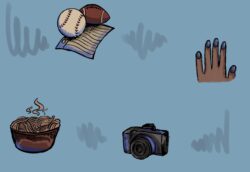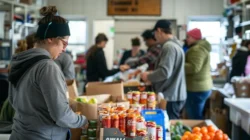Midway through Vagabond Improv Comedy’s show on October 18th, the stage in Bulldog Alley in the Leavey Center has turned into utter pandemonium. One performer is beating his chest and hurling another performer onto the floor, while a third is whirling around dizzyingly on one foot, and a fourth is obliviously tying his shoe. It is one of those bizarre, spontaneous scenes that can’t be replicated, a had-to-be-there moment, and the audience is eating it up. For the remainder of the show, students clutch their sides and roar with laughter. By any standard, the performance is a success.
Formed last year by Max Lambertson (SFS ’11), Vagabond is one of two improv groups on campus. The other, the Georgetown Players Improv Group, of which both Lambertson (and the author of this story) are members, is officially part of the Department of Performing Arts at Georgetown. He started Vagabond as an unofficial group to increase performance comedy’s presence on campus.
It’s apparent that the performers have put a lot of effort into the revue itself. After the show, however, the improvisers in Vagabond reveal that the real difficulty lies in overcoming the obstacles to practicing comedy at Georgetown in the first place.
“Unless you have the initiative and zeal to get a group of your own started, comedy isn’t something you can just slide into at Georgetown,” Lambertson wrote in an e-mail. “We don’t even consider becoming official [because we are] already expecting what a bureaucratic nightmare it would be to get something started that doesn’t resemble ‘regular’ theatre.”
But for a school whose theater program only recently began to offer a major, and whose two student-run comedy groups pale in comparison to the numerous offerings of a school like New York University, Georgetown has produced a surprising number of graduates who are working successfully in comedy. Almost a dozen alumni, including well-known comedians Jim Gaffigan (MSB ’88) and Mike Birbiglia (COL ’00), television actor Nick Kroll (COL ’01), Mitch Hurwitz (COL ’85), creator of FOX’s beloved but cancelled Arrested Development, and Bradley Cooper (COL ’97), of Hangover and Wedding Crashers fame, have made it big in acting, stand-up, television and film writing. And to get there, they overcame many of the same challenges that Vagabond’s company faces now.
***
If anything, practicing comedy at Georgetown was even harder in past decades than it is presently. Few of the comedy troupes that have come and gone at Georgetown have ever been University-affiliated, and in the past, performers were constantly challenged with finding ways to perform on campus at all. Part of the problem is the red tape it takes to become a University club.
When Ed Herro (COL ’99) arrived on campus in 1995, Georgetown did not offer any student-run comedy groups. The main theater groups were the Mask and Bauble Dramatic Society and Nomadic Theatre, neither of which offered opportunities for improvised shows, but Herro wasn’t interested in traditional theater; he wanted to do improv.
Along with Chris Fosdick (COL ’99) and Mike Burns (COL ’98), he founded the Georgetown Players Improv Group. Unlike other improv groups that have popped up over the years, the Players sought official University affiliation, which would allow them to perform in on-campus venues.
The going was not easy. The University claimed what the group offered was too similar to what Mask and Bauble was doing, and the fledgling troupe received lackluster support from Georgetown, according to Donovan.
“It sucked,” Brian Donovan (COL ’00), a writer for Late Night with Jimmy Fallon and NPR’s Fair Game, said. “It was really tough to get anything done.”
Nonetheless, the burgeoning ensemble of comedians seemed to have enjoyed instant popularity. Donovan remembered that even in its early days, the Players regularly ran sold-out shows in Bulldog Alley. The troupe also discovered that there was an advantage to being the first significant comedic troupe at Georgetown. As Kroll, who co-starred in ABC’s short-lived Cavemen and will star in FX’s upcoming The League, put it, they were the only game in town.
“We basically had no competition,” he said.
As a University-affiliated group, the Players could charge admission to shows, and with tickets at $5 a person, they were generating significant money. The group, however, could not keep that money for its own use—in a compromise to gain University support, the troupe agreed to create Children’s Theater, a group that performs free shows for underprivileged D.C. youth, and support it with show profits.
With strong student support, the group began regularly selling out their monthly shows, and their ambitions broadened. They wanted to use some of the money they made to do workshops with professional improvisers in New York, but their requests were consistently turned down. After two years, Birbiglia, Herro, Alison Becker (COL ‘99), Burns, and Donovan grew frustrated with the University’s resistance to their efforts to expand.
In 1997, they split off to form a separate group called The Regal Beagles. Soon, they put on “The No Show,” a sketch show that combined improvisational and musical comedy. According to a laudatory Voice review of the show (“5 guys in affected disguise,” Georgetown Voice, September 11, 1997), it featured Herro as a libidinous John Carroll statue who made catcalls to students and an outrageous parody of a Georgetown acting class that ended in the actor staging his own death in a pool of fake blood.
But before it could be performed on campus, the actors had to battle resistance from the Georgetown administration.
“The show had four future comedians, so of course it was fuckin’ hilarious,” Donovan said. “But Georgetown wanted nothing to do with it. They really wanted us not to exist.”
The newly-formed Beagles weren’t allowed to practice on campus. Only after they had prepared the entire show did the Department of Performing Arts allow them to perform, provided that the show be officially produced by Nomadic Theatre. Ron Lignelli, DPA’s Administrative Director who oversaw the operations of the Players, could not comment for this story.
Ultimately, the performers were left baffled by what they saw as an indifferent or mildly hostile University response to their show.
“We all loved the group and loved what was going on, but we never really felt appreciated there,” Kroll said. “I don’t feel like they realized what we were doing and what we have done.”
There was, however, one advantage to having to wrestle with the University for the opportunity to perform. While he had resented the administration, Birbiglia said, the struggle with the school prepared the Players for the far more arduous career path they would face once they graduated. It was the players’ enthusiasm that gave them the drive to duke it out with administrators and put on the “No Show.”
Lavoie saw the experience as an endurance test. “I think being at Georgetown weeds out the artists who don’t want to truly be artists because they make it so difficult to do anything,” he said.
Dr. John Glavin disagrees that Georgetown does not provide a conducive environment for comedy. A member of Georgetown’s faculty since 1967, the playwright and English professor has seen talented students pass through his screenwriting classes for over 40 years. He’s quick to point out that John Guare (COL ‘60), comedic playwright and author of Six Degrees of Separation, and Jack Hofsiss (COL ’71), a Tony Award-winning theater director, are Georgetown grads, and bristles at the notion that Georgetown doesn’t welcome students interested in comedic arts.
“I would recommend anyone interested in the ‘arts’ to come to Georgetown,” Gavin said. “I think an artist needs to know lots of different things—how to think analytically about themselves, about the world, and about the genre he or she works in. That’s what Georgetown offers.”
Even though they remembered encountering difficulties while at Georgetown, several recent graduates conceded Glavin’s point.
Birbiglia said that he felt he graduated with a “balanced view of the world,” having interacted with people in diverse fields of study.
Becker agreed, saying, “Georgetown gave me something that few other schools could have: the chance to create with genuinely intelligent people,” she said. “You can’t be an idiot and be a good comedian—you have to play to the height of your intelligence.”
***
Today’s on-campus comedy scene remains more or less undeveloped, as it was a decade ago. Outside of the two improv theater groups—Vagabond and the Players—and an almost-defunct stand-up club, the school has not benefitted much from its graduates’ recent success in comedy.
As that first group of improvisers and comedians graduated from Georgetown and began to work in New York, they initially maintained a strong connection with the University, helping the remaining members bring in professional improv groups and returning to perform and give advice. Yet after a few years, these relationships deteriorated.
Kroll said that “Georgetown dropped the ball in cultivating a relationship between the school and this burgeoning community of Georgetown comedians who had graduated and gone to New York.” John Mulaney (COL ’04), a stand-up comic who writes for Saturday Night Live, also describes feeling “indifference” from the University toward his developing career in New York.
“Georgetown just isn’t a performing arts school,” he said.
Becker’s experience after graduation was different. “The Georgetown alumni—especially those involved with the Georgetown Entertainment Media Alliance—are insanely supportive of any alum pursuing a career with comedy today,” she said.
Either way, there’s a disconnect between the first batch of improvisers and the current generation. For a couple of years after the Players graduated, “people stopped talking about comedy,” Herro said. Still, after recent trips back to campus, he thinks the current scene “looks really good.” The fact that there are two improv groups with strong student support speaks to the fact that the comedic aspect of Georgetown is getting stronger, he said.
The Vagabond show ends with a back-and-forth between a sunscreen-happy lifeguard named Frank the Tank and his lemonade-chugging rival Mike. Their rivalry degenerates into a playful fight over a “girl” played by a burly male actor.
The audience roars with laughter and appreciative applause. The performers know they have put on a good show. What’s more, they have done so in the same room where Mike Birbiglia and John Mulaney got their starts. The performers smile, clasp hands, and bow in unison.






Georgetown somehow attracts a lot of smart, talented and motivated students. It has great profs too. But the administration has been abismal for decades. It’s peopled with carpetbaggers who studied elsewhere and have no real commitment beyond CYA and securing their share of “power”.
I’ve seen this first-hand while co-founding GUTV with John Collier. I also saw this when I started a course-evaluation website in ’97 and was made to shut it down by “Dean” Kapusta. A couple of years later, some guy sold a similar concept for millions (coursereview.com).
Harvard, Standford and other well-run schools support their students in all their various endeavors and quests. While it’s easy to say that the Georgetown treatment toughens one up and prepares one for the real world, the fact is that schools should catalyze students’ success. The list of successful comedians, writers and scientists that have come out of such places is very long. That’s not due to coincidence or their student body being incredibly more talented. It’s due to their students getting a leg up rather than being made to walk through quicksand.
A very solid, informative, engaging article.